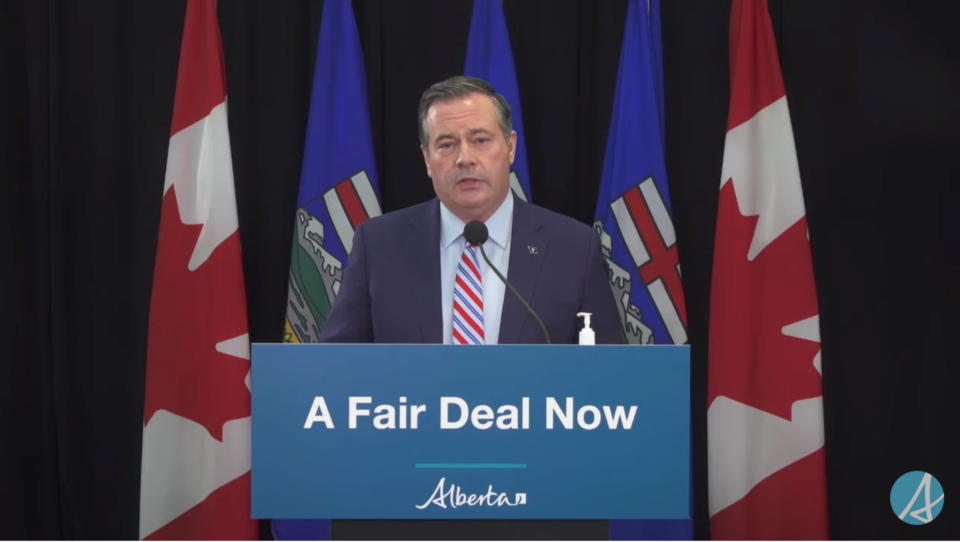Albertans have voted to remove equalization from the Constitution, and Alberta's Premier Jason Kenney said he would be tabling a motion in the legislature to ratify the results.
“Today we have heard the results, a clear majority (61.7 per cent) of Albertans have rejected the fundamentally unfair equalization program,” Premier Jason Kenney said in a Tuesday press conference.
On Oct. 26, Elections Alberta released the official results for the Senate and referendum questions.
There were two referendum questions on the ballot. The first question asked about equalization. The second question asked about daylight saving time.
The majority of Albertans who voted in the referendum voted "yes" to the question: Should section 36(2) of the Constitution Act, 1982 — Parliament and the Government of Canada’s commitment to the principle of making equalization payments — be removed from the Constitution?
The chief electoral officer announced 61.7 per cent or 642,501 Albertans voted "yes" to remove equalization from the Constitution.
The results from this referendum are non-binding. A ‘yes’ vote from Albertans does not constitutionally mandate the federal government to make a change.
Kenney said he will be tabling a motion in the legislature to ratify the results, which if passed will formally initiate a Constitutional amendment negotiation.
“This is based on a very clear language of the Supreme Court of Canada in its 1998 session reference, in which the Supreme Court said that the constitutional right of each participant in the federation to initiate constitutional change must be recognized,” he said.
This right implies a reciprocal duty on the other participants to engage in discussions to address any legitimate initiative to change the constitutional order, Kenney continued.
“Albertans are and always have been proud Canadians … in many ways, Alberta is the most Canadian of the 10 provinces because of the huge migration to this province, from across the country, from Newfoundland to British Columbia,” Kenney said.
Alberta has played a major role in the prosperity of Canada, which Kenney said Albertans are proud of.
“If Ottawa and our fellow provinces want to benefit from the hard work and the resources of Albertans, then Ottawa must allow us to develop those resources to grow our economy,” he said.
There were 399,169 votes equalling 38.3 per cent against the removal of equalization from the Constitution.
Official results from St. Albert for the referendum question on equalization show 8,945 people voted "yes" to remove equalization from the Constitution and 7,913 people voted "no" to removing equalization from the Constitution. Altogether 17,780 people voted on equalization. There were 922 rejected votes and 919 blank votes.
The second question on the Oct. 18 ballot asked: Do you want Alberta to adopt year-round daylight saving time, which is summer hours, eliminating the need to change our clocks twice a year?
The results weren’t so decisive. “No” votes amounted to 50.2 per cent of ballots cast, while “yes” votes amounted to 49.8 per cent of ballots cast.
“We will respect the outcome and not pursue this matter any further,” said Kenney.
The context, he continued, is that all of the neighbouring jurisdictions — British Columbia, Saskatchewan, Yukon, the Northwestern U.S. states — are all moving to year-round daylight saving time.
“We thought it was important to consult Albertans on whether they wanted to follow suit,” said Kenney.
Official St. Albert results for the question on daylight saving time show the majority of St. Albertans — 10,038 of them — voted "no" to keeping daylight saving time permanent, while 7,374 people voted "yes" to keeping daylight saving time permanently.
There were 17,826 electors who voted on the topic. Rejected votes amounted to 414, while blank votes totalled 408.
Albertans also got the opportunity to choose Senate nominees.
The three candidates who received the highest votes were Pam Davidson, Conservative Party of Canada candidate, with 18.2 per cent of the votes; Erika Barootes, Conservative Party of Canada candidate, with 17.1 per cent of the vote; and Mykhailo Martyniouk, Conservative Party of Canada candidate, with 11.3 per cent of the vote.
Senate votes are also non-binding.
“I will be introducing a motion in the legislature later [Tuesday] calling on the prime minister to respect the basic principle of democracy and to fill those two seats with Senate nominees selected by Albertans in last week's election,” said Kenney.
As per the Canadian Constitution, the Governor General chooses Senators based on the recommendation of the prime minister.
Recommendations for Senate positions are given to the prime minister by the Independent Advisory Board for Senate Appointments. The board was created in 2016 and is an independent and non-partisan body.
Anyone can apply to be a senator through the board. The mandate of the board is to provide non-binding and merit-based recommendations.
“We'll be recommending to Ms. Davidson, Ms. Barootes, and Mr. Martyniouk that they apply through the Federal Senate Appointment Advisory Council. But really, that should be simply a technical process,” Kenney said.
Read more from StAlbertToday.ca



